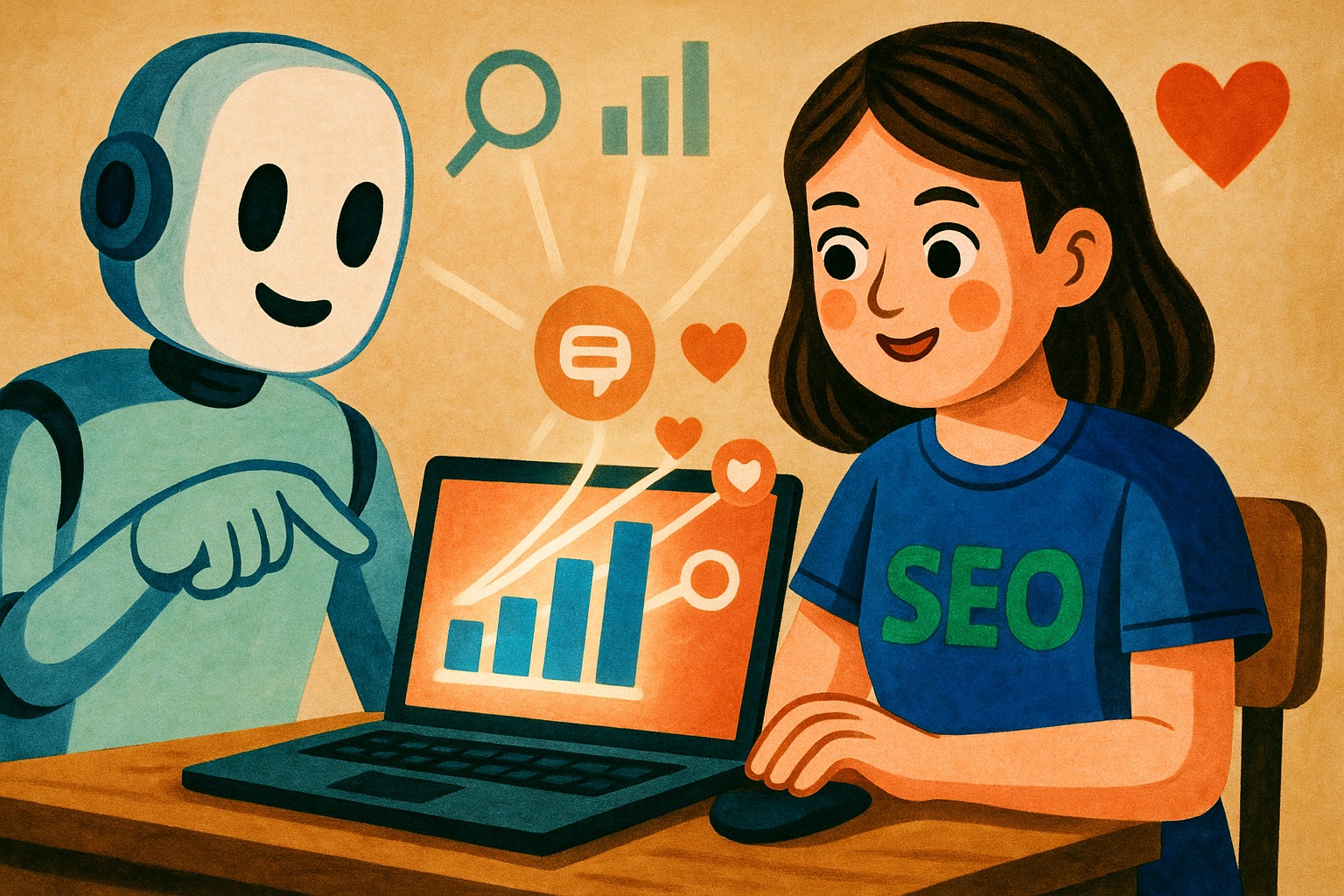
SEO ft. AI: 4 Ways This Collab Is Transforming the Marketing Landscape
May 16, 2025
There’s a running concern among marketers these days—AI is here to revolutionise traditional methods of marketing. Elevating visuals, banners, ads, codes, presentations and content with ease. So, what does it mean for SEO with all the advanced changes made in the digital landscape? Is it on its way out? Quite the opposite.
Today, AI-powered platforms don’t just optimize for keywords, it reads user intent, historical data, search patterns, analyses trends and crafts content that is designed to appeal to marketing goals effectively. Let’s break this down. Traditionally, keyword research involved identifying popular search terms related to a specific industry. However, with advancements in NLP, AI-powered tools can now analyse not only exact keywords but also understand context and intent behind user searches.
SEO & AI are now being touted as the new power couple, accelerating brand visibility. With the emergence of ChatGpt, Apple Intelligence, Gemini and Jasper, SEO is attending an on-going training module of being more intelligent and effective.
As algorithms become increasingly tricky and hard to predict, search engines are leveraging AI to enhance user experience and deliver accurate results. AI algorithms are designed to mimic human intelligence by analysing vast amounts of data, and learning patterns. With machine learning at its core, AI can adapt to changing trends and user behavior with remarkable precision.
Curious how AI & SEO are teaming up to change the every spectrum of Modern SEO? Let’s take a closer look:

1. AI and On-Page SEO :Historically, on-page SEO focused on keyword density, title tags, and meta descriptions. But modern users—and search engines—demand relevance, speed, and intent-driven content. AI makes that possible at scale. Stats prove that 63% of businesses use AI to generate content outlines, and 60% for keyword research (FlyingCatMarketing).
- Content Optimization: AI tools like GPT-4 assist in creating high-quality, keyword-aware content that’s also aligned with search intent. Rather than guesswork, AI suggests structure, readability improvements, and even internal linking.
- Semantic Search: Tools leveraging Google’s Knowledge Graph and Latent Semantic Indexing (LSI) analyze term relationships to recommend broader topical coverage, boosting relevance.
- Real-time Technical Fixes: AI can assess site speed, mobile responsiveness, and even auto-generate schema markup—streamlining technical SEO across devices.
- Visual SEO Enhancements: AI compresses images without compromising quality, generates descriptive ALT tags, and tests layouts for UX efficiency.

2. AI and Off-Page SEO :Off-page SEO has always been about authority and trust, primarily through backlinks. But in the AI era, it’s about more than quantity—it’s about context and credibility. A Forbes Advisor report shows 46% of businesses already use AI for personalized advertising, extending its off-page potential.
- Sentiment Analysis: AI monitors brand mentions and determines whether they’re positive, neutral, or negative—helping brands proactively manage online reputation.
- Backlink Intelligence: AI evaluates backlink profiles, identifies toxic links, and finds high-value opportunities by analyzing competitor strategies.
- Content Discovery: AI can suggest high-authority platforms for guest posting, influencer outreach, or earned media opportunities by analyzing industry relevance.

3. AI and Local SEO :
As mobile and location-based searches surge, local SEO has become critical—especially for startups targeting city-specific or regional audiences.
- Geo-Behavioral Analysis: AI identifies regional search trends, preferences, and competitor activity, helping startups localize content more effectively.
- Review & Reputation Insights: AI algorithms track and analyze online reviews and feedback to offer actionable insights for improving brand perception locally.
- Automated Listings Management: AI helps maintain consistent business listings (NAP data), manage Google My Business profiles, and optimize for local packs.

4. AI and Voice Search SEO :
With the rise of digital assistants like Siri, Alexa, and Google Assistant, voice search is becoming a mainstream habit. This shift demands SEO strategies that interpret natural language and conversational intent—AI’s specialty. AI-driven voice optimization ensures that content responds clearly and contextually to spoken queries, an area increasingly crucial as mobile and hands-free searches dominate.
- Natural Language Processing (NLP): AI decodes context and phrasing in spoken queries, aligning content with how people actually talk—not just type.
- Predictive Content Strategy: AI models like BERT anticipate the most likely voice queries and adjust content to match those verbal search patterns.
- Featured Snippets & Position Zero: AI helps structure answers concisely—ideal for voice search, which often pulls content from top results or snippets.

But is AI 100% accurate all the time?
While it’s impressively capable, AI can make mistakes—especially with accuracy, data-heavy writing, or nuanced narratives. This can occur due to ambiguities in language, misidentifying data, losing context of the dialogue, or even due to user input that deviates from trained models. Therefore, since SEO hinges on high-quality content, that’s a serious consideration.
Cadbury 5 Star leaned into this truth with delightful irony in their Make AI Mediocre Again (M.A.M.A) campaign. Known for their “Eat 5 Star. Do Nothing.” ethos, they built fictional server farms designed to slow AI down—feeding it nonsense content so that it would become just as flawed as humans. The campaign playfully reminded us that blind reliance on AI can be as risky as ignoring it altogether.
So, is this the dawn of the “Do Nothing” era?
Not really. It’s the beginning of the “Do What Matters” era.
We’re entering a time where it’s not about doing more—it’s about doing what works, with clarity, focus, and purpose. Yes, less is more. But only when it’s smarter, sharper, and more strategic.
AI is helping us rethink how we create, optimize, and scale—but it’s not replacing the human spark. Especially in a space like SEO, where storytelling through data is essential.
Startups, especially, stand to gain the most. With limited time and resources but limitless ambition, AI becomes a multiplier. And the results are speaking loud and clear:
- 1 in 5 marketing teams saw a 50% productivity boost with AI
- 52% report faster execution
- 50% have seen AI positively impact their web traffic
So yes, AI and SEO don’t just complement each other—they complete each other.
Tools will keep evolving. Trends will keep shifting. But what stays timeless is creative clarity and strategic intent.
Marketing isn’t changing its core—it’s just evolving in how we bring it to life.
Now, it’s more insightful, intelligent, and inspirational than ever before.
If you’re ready to explore what that future looks like for your brand—whether it’s a fresh start or your next level—we’re here to help shape it with you. After all, partnering with the best digital marketing agency for startups isn’t just about marketing. It’s about momentum.
Let’s build it—together.
Next Story

Top 8 Traits of the Best Advertising Agencies in Kolkata
Jun 11, 2025
There’s a running concern among marketers these days—AI is here to revolutionise traditional methods of marketing. Elevating visuals, banners, ads, codes, presentations and content with ease. So, what does it…
Read More





